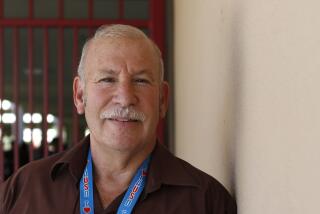LAUSD: Public education and private money may prove a mixed bag
These days, public schools have to get their money where they can. And that’s what the Los Angeles Unified School District is doing. Last week, The Times reported that about 20 senior jobs in the school bureaucracy will be funded not by taxpayer dollars but by philanthropists Eli Broad and Casey Wasserman, the Bill & Melinda Gates Foundation and others.
Times are unquestionably tough, and funding for schools has been cut to the point that they’re struggling to fulfill their mission, so we support taking private dollars to help make ends meet. But there is reason for concern when a slate of top positions is filled through the largesse of benefactors, even well-intentioned ones, who have their own agendas in the school reform wars.
Broad and Wasserman, for instance, are strong proponents of charter schools, and the Gates Foundation has supported charter schools as well as softening tenure rules and making test scores a bigger part of teacher evaluations. Several of the new hires also come from that reform world. The new superintendent of schools, John Deasy, is a former official at the Gates Foundation.
Again, there’s not necessarily a problem with any of this. Deasy appears to be a thoughtful and smart leader for L.A. Unified, and he deserves a chance to show what he can do with his own team. If he can do it without dipping into classroom resources, so much the better. The problem is that it can be difficult over time to figure out who’s driving the reform train. Deasy says he will not “accommodate a funder” and that he’ll set the agenda. But those lines can blur all too easily in a cash-strapped school system that must continually plead for money.
Bill Gates used to believe that one of the solutions to failing schools was to create smaller ones with 500 students or fewer. His foundation spent $1 billion toward this; seeing the opportunity to bring in private dollars, districts started shifting to smaller schools. Small schools became the big new trend. But then the foundation conducted a study that found that, by itself, school size had little if any effect on achievement. The foundation dropped the project and moved on to teacher reform, but by then some urban districts throughout the nation had changed to small — and more expensive to operate — schools.
Let’s say a school district sought funding for a new teacher evaluation system that would include classroom observation and a computer system to measure teacher success by how students score on standardized tests. What if a benefactor were willing to chip in for the data system but not the evaluations? Might that skew what the evaluation system ended up looking like?
L.A. Unified has long needed to set up a fundraising arm to bring in more money. Ideally, it would be a nonprofit organization that openly seeks donations from diverse sources and provides for the needs of as many schools as possible. It could include a public wish list of spending priorities.
Philanthropists understandably want their money to be spent on projects they deem valuable, with a minimum of waste. But school officials — who are answerable to voters and taxpayers — must be cautious about ceding too much control over how the money will be spent or the setting of priorities for the district. At times, it can be too tempting to go where the money is.
More to Read
A cure for the common opinion
Get thought-provoking perspectives with our weekly newsletter.
You may occasionally receive promotional content from the Los Angeles Times.










